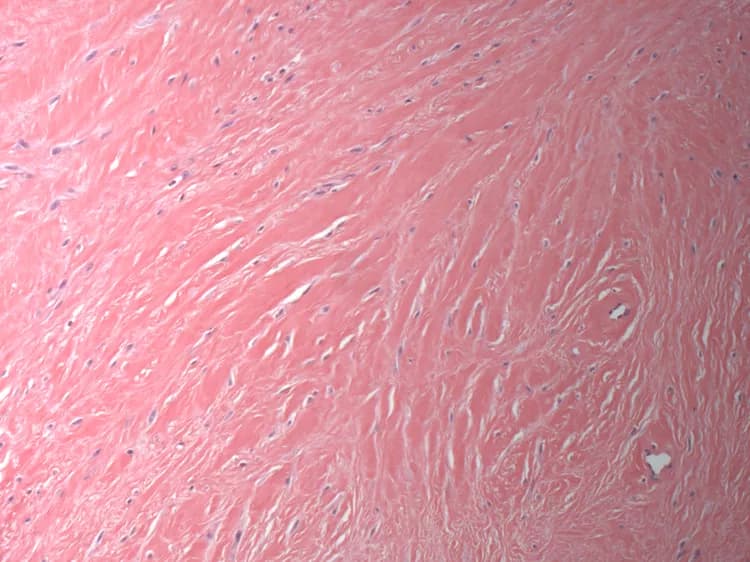What are the other Names for this Condition? (Also known as/Synonyms)
- Angiofibroma of Tendon Sheath
- Tenosynovial Fibroma
What is Fibroma of Tendon Sheath? (Definition/Background Information)
- Fibroma of Tendon Sheath is a benign, uncommon tumor of the tendon sheath, which occurs in the hands (wrist, fingers) and feet of young and middle-aged adults
- It is a slow-growing mass, often present for years before being noticed. The condition is usually painless
- A surgical removal of the tumor is the preferred treatment method; though, the condition may recur in about one-fourth of the cases.
- The prognosis of Fibroma of Tendon Sheath is excellent with appropriate treatment
Who gets Fibroma of Tendon Sheath? (Age and Sex Distribution)
- Fibroma of Tendon Sheath may occur in individuals of all races, ethnic groups, and gender
- It is known to occur in adults between the age ranges of 20-50 years
- It is more common in men than women
What are the Risk Factors of Fibroma of Tendon Sheath? (Predisposing Factors)
- No risk factors are known to be associated with Fibroma of Tendon Sheath
It is important to note that having a risk factor does not mean that one will get the condition. A risk factor increases ones chances of getting a condition compared to an individual without the risk factors. Some risk factors are more important than others.
Also, not having a risk factor does not mean that an individual will not get the condition. It is always important to discuss the effect of risk factors with your healthcare provider.
What are the Causes of Fibroma of Tendon Sheath? (Etiology)
The cause of Fibroma of Tendon Sheath formation is unknown.
What are the Signs and Symptoms of Fibroma of Tendon Sheath?
The signs and symptoms of Fibroma of Tendon Sheath include:
- Swelling of the tumor mass, seen on the fingers, wrists, or feet
- The tumor is generally less than 2 cm in size
- This slow-growing tumor is normally painless
How is Fibroma of Tendon Sheath Diagnosed?
A diagnosis of Fibroma of Tendon Sheath may involve:
- A physical examination and evaluation of complete medical history by a healthcare provider
- MRI scan of the affected region
- A tissue biopsy, where the tissue is examined by a pathologist under the microscope, to arrive at a definitive diagnosis
Many clinical conditions may have similar signs and symptoms. Your healthcare provider may perform additional tests to rule out other clinical conditions to arrive at a definitive diagnosis.
What are the possible Complications of Fibroma of Tendon Sheath?
Complications from Fibroma of Tendon Sheath are usually not observed. However, the condition may recur on incomplete removal of the tumor mass.
How is Fibroma of Tendon Sheath Treated?
The treatment of choice for Fibroma of Tendon Sheath is a complete surgical excision. Nevertheless, 25% of the tumor cases recur after surgery, because it is sometimes difficult to remove the entire tumor.
How can Fibroma of Tendon Sheath be Prevented?
Currently, there are no specific methods or guidelines to prevent Fibroma of Tendon Sheath.
What is the Prognosis of Fibroma of Tendon Sheath? (Outcomes/Resolutions)
- The prognosis of Fibroma of Tendon Sheath is generally excellent with proper diagnosis and treatment
- However, the tumor may recur, if it is incompletely removed during the surgery
Additional and Relevant Useful Information for Fibroma of Tendon Sheath:
A giant cell tumor of tendon sheath (GCTTS) is a benign tumor consisting of many types of polygonal cells in a bed of collagen. It involves the joint fluid sac, tendon sheath, and synovial membrane of the joints.
The following article link will help you understand giant cell tumor of tendon sheath (GCTTS).
https://www.dovemed.com/diseases-conditions/giant-cell-tumor-of-tendon-sheath-gctts/
Related Articles
Test Your Knowledge
Asked by users
Related Centers
Related Specialties
Related Physicians
Related Procedures
Related Resources
Join DoveHubs
and connect with fellow professionals



0 Comments
Please log in to post a comment.